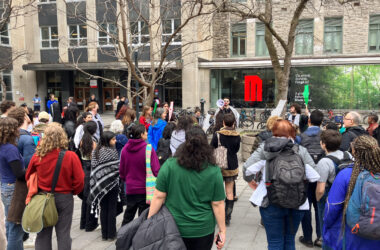 Anna Bock
Anna BockDavid Suzuki, the famed Canadian author and environmentalist, was welcomed by the McGill Bookstore last Tuesday. With the release of his newest book The Legacy: An Elder’s Vision for our Sustainable Future, the author addressed an eager McGill audience in a full Pollack Hall, presenting what he referred to as “a lifetime of thought distilled into a one-hour lecture.”
“It’s his legacy project, and it’s probably one of his final projects,” said Anna Stein, events administrator of the McGill Bookstore. “He is getting older and he is recognizing that and so it’s his big push to pass it on to the youth.”
To set the right mood, Suzuki began his lecture by taking the audience on an imaginary journey to four billion years ago, when the Earth was unsuitable for life. He stressed that the human race today has a large ecological footprint, due to the vast amount of resources needed to sustain an exponentially growing population, as well as our increased appetite for “stuff,” which has led to an ever increasing consumer culture.
“We have become cut off from the world that keeps us alive,” Suzuki said. “We forget that the word economics comes from the same group word as the word ecology … which means home.”
This way of thinking, Suzuki said, has led to value economy over ecology, an unsustainable idea in a world constrained by the laws of nature.
“We depend for our very survival on ecosystem services, but economists are so smart they figure we don’t need that,” he said. “They’re not even in the economic equation. They refer to them as an externality.”
Suzuki argued that the 2008 economic recession was a wasted opportunity to change the direction of the economy. Instead, trillions of dollars were injected back into the system that led to the recession in the first place.
“The definition of insanity is doing the same thing over and over again expecting a different result,” said Suzuki.
As the night proceeded, Suzuki moved on to climate change and the federal government’s inaction on the issue.
Stephen Harper’s government, Suzuki said, has decided to focus on the economy, and has failed to act on climate change. He used the example of Sweden, a country that has managed to reduce greenhouse gas emissions to 8 per cent below 1990 levels and at the same time achieve an economic growth of 44 per cent over the same period of time, to demonstrate that the two targets are not mutually exclusive.
“Our prime minister for more than four years has said there’s no way we are going to act on climate change […] because it will ruin the economy,” Suzuki said, “How dare you tell us that? It’s time to put the ecology back into the economics.”
As the talk progressed, Suzuki said that the exponential growth of the human population, coupled with the ever-present desire for growth in a fixed biosphere, is leading humanity on a “suicidal path.”
“The only two systems that think they can grow forever are cancer cells and economists,” he said, adding a little humour to his lecture.
Suzuki, 74, also took the lecture as an opportunity to reflect on his legacy.
“We’ve gone off on this weird tangent to think that stuff is what makes us happy, [but] the most important things in life have to do with people and the things that we share and do together,” he said.
“At this stage in my life, whatever governments, corporations do or do not do will have very little impact on my life,” he continued. “But what corporations and governments and society does or does not do will reverberate through the entire life of our children and grandchildren.”
After the talk, a question-and-answer period followed. Befitting Suzuki’s desire to pass on his knowledge, a 12-year-old boy asked the final question.
“It’s amazing to see he’s doing this decades after and still going strong, and it’s an inspiration more than anything, that you can’t let anything let you down,” said Ana Vadeanu, a U3 Environment student who attended the talk.
“We’ve partied as if there’s no tomorrow, and we’ve forgotten to think about future generations,” Suzuki said. “Well, the party is over, it’s time to silver up, and clean up our mess and work towards a future that we can imagine into being. We’ve done it in the past, we can do it in the future, all it takes is the vision and the will to do it.”








